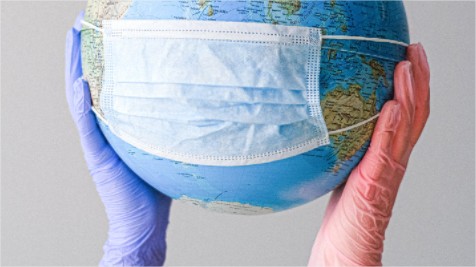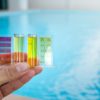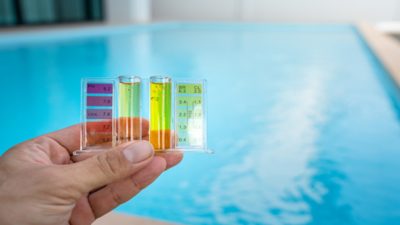Are Swimming Pools Safe During Covid? / The unfortunate pandemic has put a lot of recreational activities at a halt. Experts deem outdoor activities safer than indoor ones because they allow you to maintain a safe distance. However, when it comes to swimming pools, there’s a lot of confusion if the chance of contracting the virus increases.
With summer in full swing, everyone is eager to doze off in the aerated float beds or take a deep dive in the cool waters under the sun. But, are swimming pools safe during Covid? In this blog, MyPoolCool elaborates on all you need to know about using swimming pools amidst the global pandemic.
Is Coronavirus Water Borne?
According to Dr. Sylvie Briand, coronavirus is not waterborne and is not transmitted through water.
When in the pool, most people are not in close contact for a long time. Given that the virus spreads through physical contact, chances of transmission are low. This holds especially true for public pools as they are large and strictly regulated for capacity.
In private pools, however, safety is often compromised. This is because they are small, and you might be in close vicinity with asymptomatic people. Thus, in-house pools need extra care when in use.
Taking regular precautions like using chlorine and disinfectants in the water may kill the virus. Therefore, if you follow all the pool hygiene protocols, contracting Covid is unlikely.
Do You Need Mask and Eye Protection Inside the Pool?
As we know, masks are mandatory during Covid-19 pandemic. Since air is the primary mode of virus transmission, we need face masks to protect against it. However, do you need to wear a mask when swimming?
No! Experts recommend removing the mask when inside the pool. Wet masks are difficult to breathe through. Moreover, they are less efficient against respiratory diseases.
Thus, wearing a mask inside the pool won’t serve any purpose.
However, the eye protection equipment comes in handy to save from irritation due to chlorine and other microbes. So, yes, you should wear swim goggles. However, bear in mind that they do not stop viruses from entering your body through your eyes.
Swimming Pool Safety Precautions During Covid 19
According to the Covid-19 guidelines, certain measures reduce the probability of virus spread. Especially for the pools, there is a specific protocol to ensure safety. Following are some of the swimming pool precautions during covid-19:
Chlorination
Chlorination implies adding chlorine to treat swimming pool water. The standing water of the pool contains bacteria, infections, small aquatic life forms, and other toxins that are harmful to health. Chlorine oxidizes dirt and chloramines and kills microorganisms and insects, ultimately detoxifying the water.
Although scientists are still researching the effect of chlorine on coronavirus, we do know that it can kill viruses. For example, data shows that chlorine eliminates SARS-COV. Therefore, experts are hopeful that it would have similar effects on SARS-COV-2 (Covid-19).
The U.S Center for Disease Control and Prevention (CDC) claims that bleached water would inactivate coronavirus. Therefore, it is crucial to chlorinate both public and indoor pools.
Disinfectants
Chlorine shortage is a major problem right now. After the pandemic hit, chlorine prices were sky-high due to an increase in demand and interruption in its supply. Therefore, you need to consider other alternatives to ensure that health and safety are not jeopardized.
The first in the list is Bromine, a dark halogen, less irritating than chlorine, usually available in sodium bromide. First, you need to balance the pool pH and add the powdered Bromine at 80-120 alkalinity.
The second option is saltwater, the classic home disinfectant. When in the pool, saltwater produces chlorine via a chemical reaction.
You require a proper system that indicates when chlorine levels decrease so you can add salt to the pool. Water is then stirred to ensure that salt dissolves properly. Generators are installed to help turn salt into chlorine.
Other than this, catalytic oxidation, ozone, copper ionization are also some of the options in place of chlorine. However, all of them need additional equipment to work.
Maintain the Pool pH
Pool pH determines the clarity of the water as well as the efficiency of disinfectants. In addition, evidence shows that a well-maintained ratio between pH and chlorine can inactivate viruses within a few seconds.
The lower the pH, the more effective chlorine will be against the coronavirus. A pH between 7.0 and 7.4 and chlorine in the range of 1.5 to 3 ensures optimal safety.
Regulate the Pool Capacity
Even though the virus itself is not waterborne, being near many people increases the risk of virus transmission.
It is easy for swimming pools in clubs, schools, hotels, and offices to follow protocols and ensure that no more than a certain number of people enter the water. However, in the backyard pools, people need to self-police and make sure that the capacity is regulated at all times.
Although there is no specific scale to gauge the adequate capacity, it is safe if the pool doesn’t get too crowded and everyone is approximately six ft. apart.
Maintain Safe Distance
It seems like Covid is here to stay for a long time, and if we want to continue our activities without compromising health, we ought to keep an eye out for possible risks.
Even though public swimming pools are fully functional in most states, it is imperative to take care of the safe distance between the people present inside. You should maintain a six ft. distance between swimmers in outdoor pools and at least 2-3 ft. distance in the in-house pools.
Because the virus is transmitted through the air droplets, it is crucial to ensure proper ventilation.
Some Other Safety Measures
SARS-COV-2 is not waterborne. However, there is a risk of its transmission through the air because of people being in close vicinity with each other, that too without a mask. Following are some pre and post swimming precautions you can take to reduce the risk of contraction:
- Carry your own sanitizers, towels, and hand wash.
- Avoid taking a shower in the public washroom after swimming.
- Thoroughly wash your hands and take a bath with soap to wash away any microbes and chlorine residue.
- Wear masks outside the pool.
Conclusion
As responsible citizens, we need to keep up with all the protocols during this deadly pandemic. Safety in swimming pools during coronavirus is a serious concern, and you ought to make sure that adequate care is taken to reduce the risks of the virus.
Through this article, we tried to give a comprehensive answer to “Are swimming pools safe during Covid-19?” If you have any further queries, comment down below.






